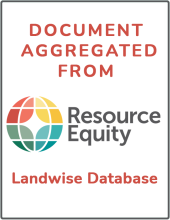Land Library
Welcome to the Land Portal Library. Explore our vast collection of open-access resources (over 74,000) including reports, journal articles, research papers, peer-reviewed publications, legal documents, videos and much more.
/ library resources
Showing items 1 through 9 of 29.It is estimated that up to 84% of Malawians earn their livelihoods directly from agriculture - it contributes over 90% to export earnings, 40% to GDP and accounts for 85% of total employment.
This report highlights key developments and recent sustainability trends in agriculture, rural development, land, desertification and drought, five of the six themes being considered by the Commission on Sustainable Development (CSD) at its 16th and 17th sessions (2008-2009).
Recent years have seen pastoralist communities in Tanzania becoming increasingly impoverished and vulnerable, due to livestock diseases, drought, fluctuating market prices and unfavourable policies.
Despite the central role of urban areas in socio-economic and geo-political change processes at the local, regional, and global level, as well as in the regional and global biophysical processes, little attention has been paid so far to the complex and dynamic interactions between urban areas and
This report details the findings of a round table discussion on land reform and agricultural development in South Africa convened by The Centre for Development and Enterprise (CDE) in October 2007.
The state of the Arab environment stands at a pivotal juncture with numerous environmental problems both current and imminently threatening the region.
Large areas of the humid tropics are like mosaics, combining features of forests and agriculture and housing hundreds of millions of people. Land uses that store high quantities of carbon, such as agroforestry and other tree-based systems, make up a large part of those mosaic areas.
The main objective of the paper is to explore possible institutional arrangements among the Comprehensive Agrarian Reform Program (CARP), Philippines, implementing agencies in a post-2008 transition scenario for CARP.


